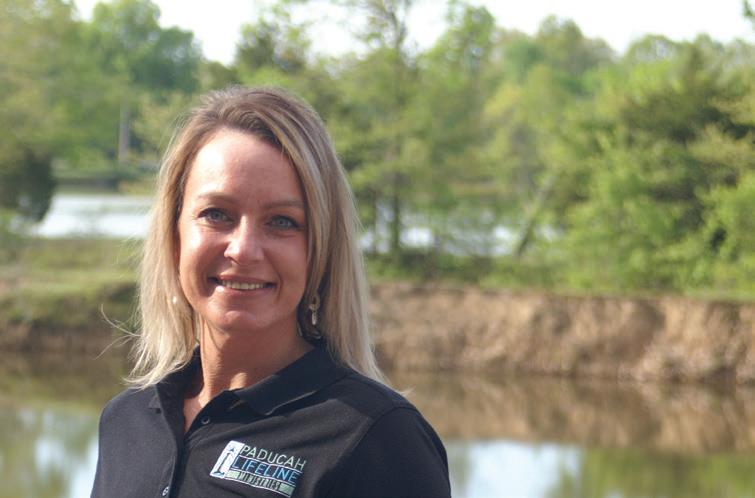
4 minute read
Strategic plan charges us to engage and inspire staff
Lifeline Recovery Center IS OUR PEOPLE
– the 15 employees, along with some six dozen volunteers, who are committed to helping our clients.
Almost all of our employees and many of our volunteers are in recovery themselves, most of them having benefited personally from the program here.
FROM THE EXECUTIVE DIRECTOR
Ashley Miller
2014 Graduate of Lifeline
According to Destination Hope, one of the nation’s leading Joint Commission accredited treatment centers, based in Fort Lauderdale, Fla., the most effective counselors are those in recovery: “Recovering addicts can offer a degree of empathy and understanding that is not only unmatched in those who have never experienced addiction, but can also be very important in the counselor-client relationship.”
Our strategic plan recognizes the value of our staff and charges us to engage and inspire them to carry out our mission.
That charge to inspire is echoed by John Mackey, CEO of Whole Foods: “If you are lucky enough to be someone’s employer, then you have a moral obligation to make sure people look forward to coming to work in the morning.”
We have been working for the last several months to offer training to accomplish that objective – training that gives our staff more confidence in helping their clients reach their goal. Our staff recently completed 30 hours of continuing education; 14 participated in weekly training, and seven completed courses to become peer support specialists (see photo, opposite page).
Billie Preston, director of the women’s campus, said the peer training has helped her and her clients. “A Peer Support Specialist can help give hope to others struggling with the same problems they once faced,” she said. “Many of our clients have never set goals for themselves. A client needs to start small, have faith in her goal, accept, and let go of the fear she may face because of setting that goal,” Billie said.
Training has boosted the staff’s expertise beyond the empathy derived from their own experience.
Program coordinator Joey Evitts said the clinical training enhanced his understanding and broadened his perspective. “I will integrate it in the Celebrate Recovery class,” he said, regarding the 12-step program.
Kim Cooper learned many tools to help her be an active listener with clients, and she also learned what NOT to do. “Do not tell them what to do,” she said, “but help them come to a decision on their own by asking them open-ended questions.”
Knowledge is confidence, and confidence is an attribute that helps us all want to go to work in the morning.
Ashley Miller, Executive Director
Why We Are Here
‘Love and a sense of community’ are keys to our clients’ success
“If you come together with a mission, grounded with love and a sense of community, you can make the impossible possible.” – The late John Lewis, Georgia congressman and civil rights activist The “Program & People” initiative in Lifeline’s strategic plan helps us make the impossible possible for the 125 to 150 people who seek our services each year. It’s the element of our plan that captures the essence of our mission to provide Christ-centered treatment for addiction recovery.
Love and a sense of community, as Rep. Lewis said, are keys to our success.
Our clients often describe their journey here as the time when Lifeline staff “poured love” into them, sometimes loving them before they could love themselves. Inspired by God’s love for them, our staff loves our clients and embodies our Christ-centered mission.
We also demonstrate a strong sense of community. About 75 volunteers teach classes, drive clients to appointments and serve the organization in other ways. Conversely, our clients spend 10,000 hours per year volunteering at community organizations, such as Community Kitchen and Midtown Alliance. Our graduates are well-equipped to re-enter their communities to make a positive impact.
Our staff embodies our mission, with most of them having gone through recovery themselves and, therefore, offering our clients unique empathy and understanding. We are working to enhance their skills through unprecedented training. (See executive director Ashley Miller’s column on page 3 for details.)
We also just added a new position, Clinical Services Supervisor, to oversee programming for a top-notch client-centered addiction treatment program.
All of these efforts are focused on one goal – success for our clients as they work to break the bonds of addiction. Currently, 63 percent of our graduates remain sober a year after completing the ninemonth program. Our goal is to increase that rate to 70 percent.
Every number represents a life saved, a family mended or a community transformed, as you see in
From The Board Chair
Steve Powless Chairman and CEO of CSI
their stories in each issue of The Lifeline. This issue features Ali Berry (see page 8), who, like many of our clients, had tried other rehab programs before finding success here. “From the moment I pulled onto the property, I knew they loved me,” she said. Now, sober since December 16, 2019, she is sharing that inspiration with new clients. “It’s my connection to Lifeline that keeps me doing so well. They are my friends and my mentors,” she said. “I didn’t think I could live without drinking, but I tell these new girls, God is not a respecter of persons. What He did for me, He can do for you. It’s miraculous.”
Those miracles, dear Lifeline friends and supporters, are why we are here.
Strategic Initiatives
Our success in realizing our mission will be measured by the extent to which we achieve the following:
PROGRAM & PEOPLE
Enhance and deliver a client-centered addiction treatment program that achieves favorable outcomes and meets the current and growing needs of our community
In future issues, we will discuss each of our strategic initiatives. To read the full strategic plan, please visit LifelineRecoveryCenter.org.






